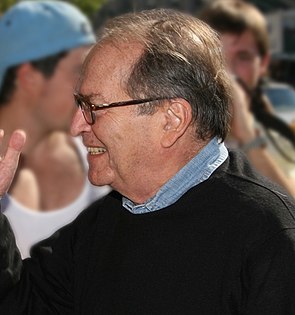Rudolph Santobello (1928 – May 2013) was a New York mobster who served as a caporegime in the Genovese crime family.

A caporegime or capodecina, usually shortened to just a capo, is a rank used in the Mafia for a made member of the crime family who heads a "crew" of soldiers and has major social status and influence in the organization. Caporegime is an Italian word, which is used to signify the head of a family in Sicily, but has now come to mean a ranking member, similar to captain or senior sergeant in a military unit. In general, the term indicates the head of a branch of an organized crime syndicate who commands a crew of soldiers and reports directly to the Don (Boss) or an Underboss or Streetboss.

The Genovese crime family is one of the "Five Families" that dominate organized crime activities in New York City and New Jersey as part of the Mafia. The Genovese crime family are rivaled in size only by the Gambino crime family, and are unmatched in terms of power. They have generally maintained a varying degree of influence over many of the smaller mob families outside New York, including ties with the Philadelphia, Patriarca, and Buffalo crime families.
Contents
On July 21, 1950, Santobello and Joseph Corbo murdered Alfred Loreto, an off-duty New York Police Department officer, during an attempted kidnapping of Ralph Sgueglia, a butcher arriving home after work, in the Bronx section of New York. Apprehended at the crime scene, Santobello later testified that police brought him to the police station and interrogated him all night. Santobello also claimed that police hit him on the head with their guns and dazed him with a blow on the nose with a billy club. In June, 1951, Santobello was convicted of first degree murder and sentenced to life in prison. [1] [2]
In 1966, a U.S. Supreme Court decision on illegal searches by police resulted in Santobello's sentence being reversed and his release from prison. In 1968, detective and whistleblower Frank Serpico arrested Santobello in the South Bronx for numbers running. Santobello was later sentenced to one year in prison, but was freed early due to another court decision on plea bargains. In later years, Santobello supervised a crew from his headquarters at "Club Arthur's', a social club on Arthur Avenue in the Bronx. From 1991 on, Santobello was heavily involved in loansharking, illegal gambling in the form of craps games, bookmaking, and numbers running.
A whistleblower is a person who exposes any kind of information or activity that is deemed illegal, unethical, or not correct within an organization that is either private or public. The information of alleged wrongdoing can be classified in many ways: violation of company policy/rules, law, regulation, or threat to public interest/national security, as well as fraud, and corruption. Those who become whistleblowers can choose to bring information or allegations to surface either internally or externally. Internally, a whistleblower can bring his/her accusations to the attention of other people within the accused organization such as an immediate supervisor. Externally, a whistleblower can bring allegations to light by contacting a third party outside of an accused organization such as the media, government, law enforcement, or those who are concerned. Whistleblowers, however, take the risk of facing stiff reprisal and retaliation from those who are accused or alleged of wrongdoing.

Francesco Vincent Serpico is a former New York City Police Department (NYPD) officer who holds both American and Italian citizenship. He is known for whistleblowing on police corruption in the late 1960s and early 1970s, an act that prompted Mayor John V. Lindsay to appoint the landmark Knapp Commission to investigate the NYPD. Much of Serpico's fame came after the release of the 1973 film Serpico, which was based on the book by Peter Maas and which starred Al Pacino in the title role, for which Pacino received an Oscar nomination.

The South Bronx is an area of the New York City borough of the Bronx. As the name implies, the area comprises neighborhoods in the southern part of the Bronx, such as Concourse, Mott Haven, Melrose, and Port Morris. The South Bronx is known for its hip hop culture and graffiti.
On October 24, 1994, Santobello was convicted on ten counts of gambling and was sentenced on March 27, 1995 to 78 months in prison. Relaxed and joking during the trial, Santorello pleaded with the judge for leniency at the sentencing hearing, citing his family ties:
- "This has been a very delicate situation for me. After getting married, having a daughter, I don't think I would be so foolish to subject myself to going back to prison at this stage of my life. I've done my best to bring my daughter up in the right manner."
Santobello also claimed that the police had a vendetta against him because of his reversed 1950 murder conviction. On June 12, 2000, Santobello was released from federal prison.
In May 2013, Santobello died of natural causes. [3]








